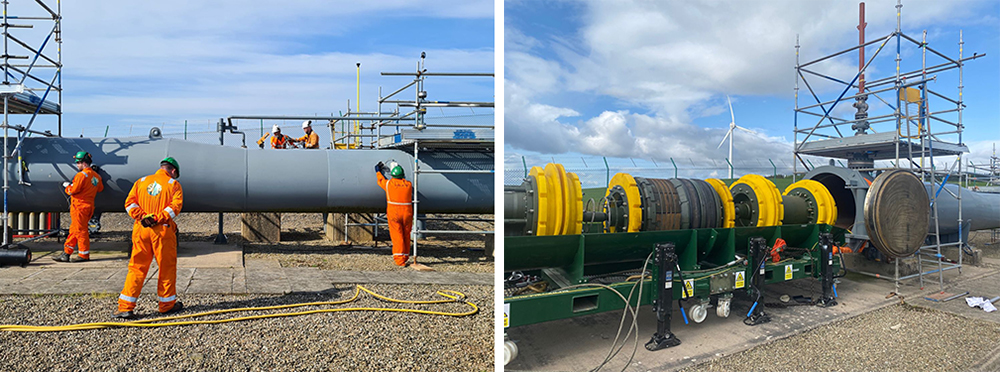August 2024, Vol. 251, No. 8
Tech Notes
Pipeline Repair Technology Slashes CO2 Emissions by 95%
Special to P&GJ
Innovative new technology used to isolate gas pipelines in need of repair or maintenance has shown to prevent gas leakages and cut carbon dioxide emissions by 95% compared with venting pipeline contents to atmosphere – the equivalent of switching off 1,760 gas boilers for a year or taking 1,000 cars off the road.
The U.K.’s National Gas, which owns and operates over 4,720 miles (7,600 km) of gas pipelines underground, has adopted STATS Group’s Remote Tecno Plug (RTP) on a recent project near St. Cyrus in Scotland.
The RTP was trialed to reduce the emissions released during pipeline isolation, a crucial process used by operators to stop gas from leaking while they perform upgrades and maintenance on the pipes. Usually, this is done through reducing the volume of gas in the pipeline by a process called recompression and then venting the remaining gas to atmosphere.
The efficient use of the RTP allows the work to be undertaken more quickly, with zero leaks during operations, improving safety and with the overall discharge of greenhouse gases significantly reduced.
Project managers estimated that traditional venting techniques would have emitted 233 tonnes of gas. However, the RTP reduced emissions to 9.5 tons, saving gas released into the atmosphere, but also resulting in significant cost savings of over $124,480 (£100,000) of gas not wasted.
This success has prompted National Gas to formalize a policy encouraging the use of this RTP technology in future isolation projects across the U.K. – with potential for these tools to be adopted by the individual gas distribution networks across the U.K. in future.
The U.K. has a legal obligation to reach net zero emissions by 2050 to address climate change, but gas is still integral to the UK, keeping the lights on and industries fueled. It’s also important for the country’s energy security, making it resilient to demand spikes or pressures on the system.
Kirsty McDermott, senior engineer at National Gas, said: “Using plugs like the RTP can greatly reduce emissions for temporary pipeline isolations and on this project, emissions were reduced by up to 24 times compared to traditional recompression methods.
“In addition to the environmental and economic benefits relative to reduced venting requirements, carrying out the trial work allowed us to interrogate the integrity of our pipelines and ensure they continue to deliver energy to where it’s needed across the U.K.,” McDermott said.
STATS’ RTP technology sealed a 35-mile (56-km), 48-inch pipeline, ensuring a leak-proof and fail-safe isolation, National Gas said. It maintained full pressurization at 55 bar in the initial use of RTP on the National Transmission System, which surpasses traditional methods like venting or recompression.
“Following the successful outcome on the project, National Gas will update existing policies to make the use of isolation tools business as usual, which in turn will reduce barriers, increase efficiency and enable more critical maintenance work to be completed,” said Neil Mackay, group senior business development manager at STATS.
In addition to operational phase tests, extensive integrity tests, independently evaluated by Specialist Engineering 3rd Parties DNV and Pipeline Integrity Engineers (PIE), were conducted to ensure the technology's reliability and safety. This work will allow for future projects to consider isolation tools in different applications.
Based in Kintore near Inverurie in Aberdeenshire, STATS employs more than 380 staff in the UK, North America, the Middle East and Australasia and is a market leader in the supply of pressurized pipeline isolation, hot tapping and plugging services to the energy industry.






Comments